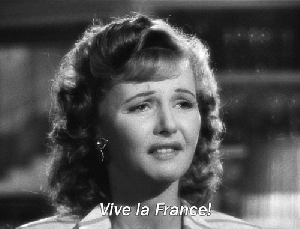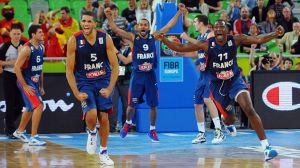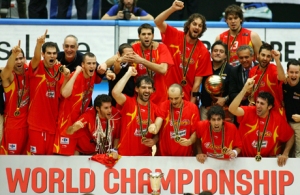FIBA’s Oceania and AfroBasket championships have already been decided. The Tournament of the Americas is winding down and the Asia championship is still two weeks away. However, EuroBasket is just a few days old and will feature a slew of meaningful basketball games to be played in the coming days. Here are a few reasons to follow along.
The Presentation
Initially known as the European Basketball Championship, EuroBasket has been around since 1935. It has taken place every two years since that inaugural tournament save a few cancellations during WWII, and it exists as a demonstration of goodwill and world-class, competitive basketball between European nations. Before each game, the national anthems of both participating teams are played, followed by an exchange of tokens between players and coaches. I never skip the anthems when watching the recorded replays and if I happen to start my live stream a little late and miss them, I’m genuinely disappointed. Watching these adult men put their arms around each other and sing their national anthem is the perfect prelude to competition. I defy you to watch it and not experience an increase in heart rate. The enthusiasm of every anthem is infectious. Maybe I’ve seen Casablanca one too many times but La Marseillaise is particularly stirring. Every time the final note plays I am Madeleine LeBeau.

Gif by Nitrate Diva
I’m not even the least bit French but let’s face it, everyone is French when La Marseillaise plays. After the anthems it’s down to the business of basketball and there are few distractions from it. On the ESPN3 broadcast there are no commercials except the occasional FIBA spot. During timeouts the camera behind each team’s bench puts you directly in the huddle. Halftime entertainment is literally just a wide shot of the court from somewhere up in the rafters while the commentators and crew take five. Until they return there is only the faint sound of sneakers squealing on hardwood as players begin to return to the court for warm ups. The commentary is generally knowledgeable and enthusiastic (though I’ve had some trouble hearing it over the in-arena noise this year). Slow motion highlight compilations with limited sound play like some sort of basketball silent film immediately after the first half and game’s end. The simplicity is endearing. I won’t oversell EuroBasket as the last bastion of basketball innocence and purity, but it’s fair to say these players do risk lucrative professional contracts and sacrifice their limited vacation time to represent their country in the sport they love. Often times they have been together since they were teenagers. Something about that and the no-frills presentation of their performance makes it feel not so far from the tournaments of my youth. It’s just basketball, and if you love that you’ll find something to love in EuroBasket.
The Fans
I’ll just leave these here.
No more really need be said. I can’t decide who I want to hang out with more: the Lithuanian drumline, the Spanish “basketbeer” team, or the French fans who wear Gallic Rooster hats. [Full disclosure: it took me years of googling variations of “French chicken head fans” in vain before I was able to sniff out the story behind those hats. I’m still not sure of the reasoning behind the headpiece of the gentleman in the unitard above. Is that supposed to be a cooked Gallic Rooster? Because it seems like that might not be a good thing. Maybe it’s just a regular old turkey. I’m at a loss.]
The Storylines
EuroBasket is replete with fascinating stories and following the tournament is worthwhile simply for the chance to experience the latest chapter in the saga of Spain and France, La Roja and Les Bleus. Spain emerged as a world power in basketball by winning the FIBA World Cup–then called the FIBA World Championship–in 2006. They went on to win two Olympic silver medals, one EuroBasket silver medal and two EuroBasket championships over the next six years. Anchored in the paint by brothers Pau and Marc Gasol and led by strong guard play from Juan Carlos Navarro, Jose Calderon and Sergio Rodriguez, Spain were consistently ranked the top team in Europe and second only to the United States in the world during that time.
Meanwhile, their French counterparts were trying to establish themselves in FIBA competition. In 2000 a couple of young players from France’s National Institute of Sport and Physical Education (INSEP) helped the junior national team win the FIBA Europe Under-18 Championship. As Tony Parker and Boris Diaw graduated to the senior level, Les Bleus became a team on the rise. For a solid decade they toiled with the dream of being the top team in Europe. In several instances they may well have been but for the shadow of La Roja. In EuroBasket 2009 Les Bleus went 8-1. Their lone loss? An 86-66 drubbing by Spain. It was enough to send them reeling to a fifth-place finish. In 2011 they inched closer still, climbing all the way to the championship game where they were again met by Spain. This time they fell 98-85, capturing the silver medal. It seemed as though Les Bleus could take no more by the time Spain beat them in the 2012 Olympics. Then, in EuroBasket 2013, France finally broke through against their longtime nemesis in an appropriately dramatic overtime thriller. It’s difficult to summarize the complicated and multi-layered recent basketball history of these two nations, but this picture of the French faces when they finally beat Spain does well enough:
 This was not the championship game, mind you. France still had to defeat a talented Lithuanian team to secure the first EuroBasket championship in their history, but it’s clear what finally getting past Spain meant to them. Their relief is palpable. The momentum continued to swing in France’s favor as a Parker-less Les Bleus beat Spain 65-52 in Madrid during last year’s World Cup. France took home the bronze while host nation Spain finished a disappointing fifth. Now, for the first time in four years, Spain enters EuroBasket without the crown. And for the first time ever, France enters as defending champion. Can they repeat? Will Spain reclaim the title? Will they meet again head to head? We’ll have the answers soon enough, but there is much more to EuroBasket than just Spain and France.
This was not the championship game, mind you. France still had to defeat a talented Lithuanian team to secure the first EuroBasket championship in their history, but it’s clear what finally getting past Spain meant to them. Their relief is palpable. The momentum continued to swing in France’s favor as a Parker-less Les Bleus beat Spain 65-52 in Madrid during last year’s World Cup. France took home the bronze while host nation Spain finished a disappointing fifth. Now, for the first time in four years, Spain enters EuroBasket without the crown. And for the first time ever, France enters as defending champion. Can they repeat? Will Spain reclaim the title? Will they meet again head to head? We’ll have the answers soon enough, but there is much more to EuroBasket than just Spain and France.
The Competition
EuroBasket has its share of blowouts. That said, the tournament has a way of producing some very closely contested games. Of the first 30 games of EuroBasket 2015, twelve have been decided by four points or less, not including the Day One overtime thriller between France and Finland that ended with a final score of 97-87. Just ten of the 30 have been decided by more than ten points. Conventional wisdom still lists Spain and France as favorites due to their recent accomplishments and the deep pool of talent each team brings to the tournament. Pau, Sergio Rodriguez, Rudy Fernandez and speedy Sergio Llull return for Spain with newcomer Nikola Mirotic of the Chicago Bulls. Parker and Diaw still lead France and are joined by Nico Batum, Nando De Colo, Mickael Gelabale and veteran workhorse Florent Pietrus. They also boast young Utah Jazz center Rudy Gobert, a 7-footer with a penchant for blocking shots who is appropriately nicknamed The Stifle Tower. Both teams are legitimate contenders but it’s hardly a guarantee they’ll meet again for the championship.
Despite the exceptional talent of the last two champions, this EuroBasket is shaping up to be the best contended in a while. Perhaps feeling the absence of Marc Gasol and Ricky Rubio, Spain has already dropped two of their four games in the vaunted Group B. France is 4-0 but only one of those victories was especially comfortable. Serbia and Greece are thus far undefeated. Croatia and Lithuania have just one loss each. All are very good teams with proud basketball traditions. Italy, two years removed from falling just one win short of qualification for the 2014 World Cup, are healthier than they have been in years and poised to make a statement. Since dropping their first contest 89-87 to Turkey they have been a team possessed. There are many skilled teams tournament schedule presents its own challenges that humble all participants. EuroBasket is a war of attrition. Teams play five games in just six days in the Group Stage. There is no time to heal and barely any to recover. Every team is forced to fight tired legs and momentary lapses or suffer the consequences. It’s March Madness with Euroleague and NBA players, fewer days off, better basketball, and–with a European title and two Olympic qualifying spots up for grabs–just as much drama.
The Basketball
It’s damn good, fun basketball. The NBA season doesn’t return for another 47 days. What else are you doing with your life? All games stream live on espn3 and if you are unable to watch live they post replays for you to watch at your convenience (I’d suggest looking up Spain vs Italy and Italy vs Germany for a start, but hurry–the game replays only stay up for a week after the games were played). Happy EuroBasket!







